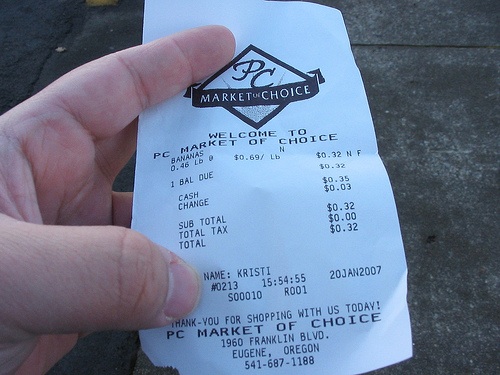 Source: Flickr/functoruser
Source: Flickr/functoruser
Laboratory tests commissioned by Environmental Working Group (EWG) have found high levels of the endocrine-disrupting chemical bisphenol A (BPA) on 40 percent of receipts sampled from major U.S. businesses and services, including outlets of McDonald's, CVS, KFC, Whole Foods, WalMart, Safeway and the U.S. Postal Service. Receipts from Target, Starbucks, Bank of America ATMs and other important enterprises were BPA-free or contained only trace amounts.
The total amounts of BPA on receipts tested were 250 to 1,000 times greater than other, more widely discussed sources of BPA exposure, including canned foods, baby bottles and infant formula...
BPA, a plastic hardener and synthetic estrogen linked by researchers to a long list of serious health problems, is used to coat thermal paper used by major retailers, grocery stores, convenience stores, gas stations, fast-food restaurants, post offices and automatic teller machines (ATMs). The chemical reacts with dye to form black print on receipts handled by millions of Americans every day...
Wipe tests conducted by the lab easily removed BPA, indicating that the chemical could rub off on the hands of a person handling the receipt.
Scientists have not determined how much of a receipt's BPA coating can transfer to the skin and from there into the body. A study published July 11 by scientists with the Official Food Control Authority of the Canton of Zürich in Switzerland found that BPA transfers readily from receipts to skin and can penetrate the skin to such a depth that it cannot be washed off. This raises the possibility that the chemical infiltrates the skin's lower layers to enter the bloodstream directly.